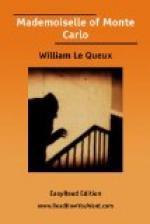“He may have been. He was, no doubt, somewhere on the Riviera, and he sent Paolo in one of the cars to rescue you from the police.”
“In that case, he at least knows that I am innocent.”
“Yes. And he probably knows the guilty person. That would account for the interest he takes in you, though you do not know him,” said Lisette. “I have known Il Passero perform many kindly acts to persons in distress who have never dreamed that they have received money from a notorious international thief.”
“Well, in my case he has, no doubt, done me signal service,” young Henfrey replied. “But,” he added, “why cannot you tell me something more concerning Mademoiselle? What did you mean by saying that she was a marque de ce? I know it is your slang, but won’t you explain what it means? You have explained most of your other expressions.”
But the girl thief was obdurate. She was certainly a chic and engaging little person, apparently well educated and refined, but she was as sly as her notorious employer, whom she served so faithfully. She was, she had already told Hugh, the daughter of a man who had made jewel thefts his speciality and after many convictions was now serving ten years at the convict prison at Toulon. She had been bred in the Montmartre, and trained and educated to a criminal life. Il Passero had found her, and, after several times successfully “indicating” where coups could be made, she had been taken into his employment as a decoy, frequently travelling on the international wagon-lits and restaurants, where she succeeded in attracting the attention of men and holding them in conversation with a mild flirtation while other members of the gang investigated the contents of their valises. From one well-known diamond dealer travelling between Paris and Amsterdam, she and the man working with her had stolen a packet containing diamonds of the value of two hundred thousand francs, while from an English business man travelling from Boulogne to Paris, two days later, she had herself taken a wallet containing nearly four thousand pounds in English bank-notes. It was her share of the recent robbery that Il Passero had paid her three days before at the Concordia Restaurant in the Via Garibaldi, in Genoa.
Hugh pressed her many times to tell him something concerning the mysterious Mademoiselle, but he failed to elicit any further information of interest.
“Her fortune at the Rooms is wonderful, they say,” Lisette said. “She must be very rich.”
“But she is one of Il Passero’s assistants—eh?”
The girl laughed lightly.
“Perhaps,” was her enigmatical reply. “Who knows? It is, however, evident that Il Passero is seriously concerned at the tragic affair at the Villa Amette.”
“Have you ever been there?”
She hesitated a few moments, then said: “Yes, once.”
“And you know the old Italian servant Cataldi?”




